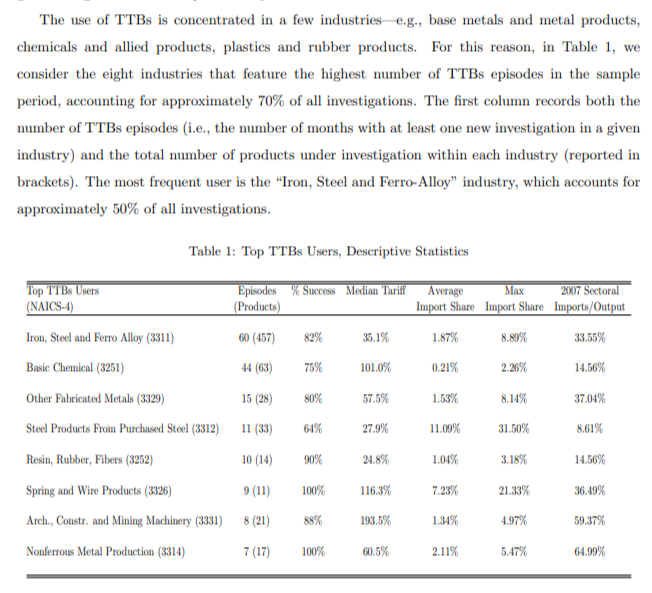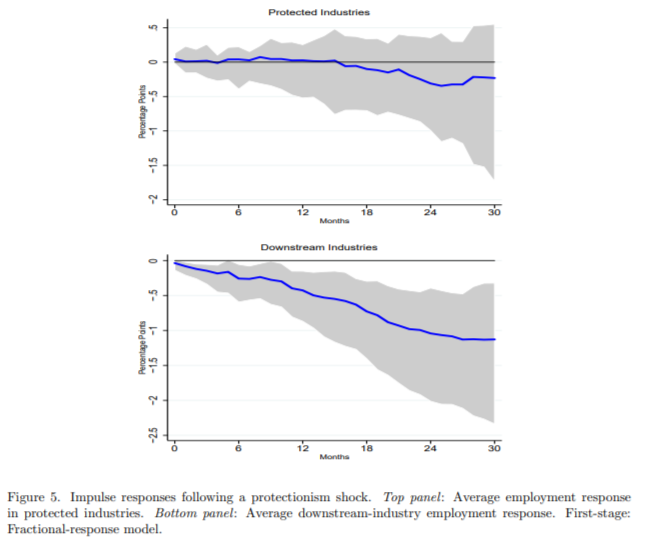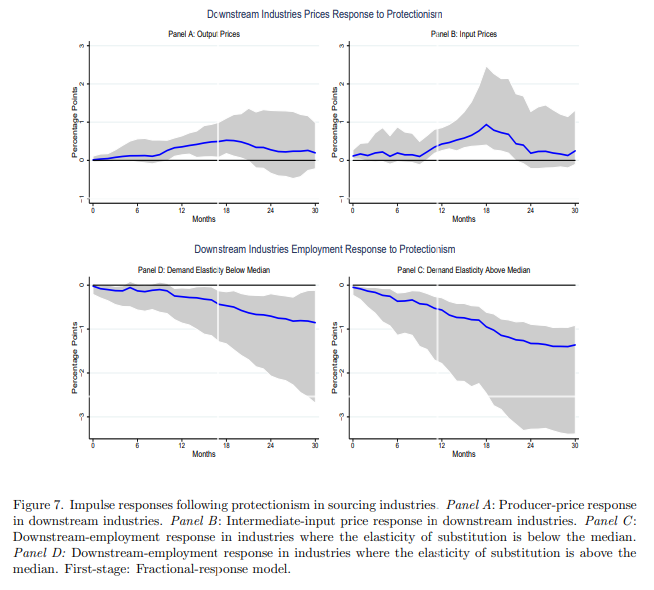This new @nberpubs paper is seriously great (and shld be a victory lap for @dikenson, who& #39;s been complaining for YEARS abt US trade remedies - especially antidumping duties - on upstream manufacturing inputs like steel).
Quick thread on the findings/implications... /1 https://twitter.com/scottlincicome/status/1290619368070619137">https://twitter.com/scottlinc...
Quick thread on the findings/implications... /1 https://twitter.com/scottlincicome/status/1290619368070619137">https://twitter.com/scottlinc...
The USA has (on average) low tariffs BUT we impose a lot - hundreds - of special "trade remedy" duties on imports. As @dikenson has shown, these measures are particularly concentrated in manufacturing inputs - ie, the stuff other US manufacturers need
https://www.cato.org/publications/trade-policy-analysis/economic-selfflagellation-how-us-antidumping-policy-subverts-national-export-initiative">https://www.cato.org/publicati... /2
https://www.cato.org/publications/trade-policy-analysis/economic-selfflagellation-how-us-antidumping-policy-subverts-national-export-initiative">https://www.cato.org/publicati... /2
The @nberpubs paper& #39;s authors decided to see how these upstream duties affected manufacturing employment in the USA. So they first collected all of the US AD/CVD measures from 1994-2015, and found - you guessed it - the aforementioned concentration (*especially* steel): /3
They next examined the US manufacturing sector, mapping out how upstream & downstream US industries interact with each other. This cool graphic (linking the industries& #39; transactions in 2007) shows the complexity: /4
(As an aside, I cannot tell you how frustrating it is that more policymakers & pundits don& #39;t acknowledge or comprehend this situation/complexity, which is absolutely critical for US policy re manufacturing & trade.) /5
Then they calculated the effects of the upstream trade remedy duties (which, they correctly note, are at HIGH rates & can last for a LONG time) on US mfg jobs for the upstream (protected) and downstream industries, finding little benefit for the fmr & big losses for the latter /6
IMPORTANT TO NOTE: jobs in the protected industries actually DECLINED after a year, even though the protectionism remained in place indefinitely. The authors speculate that this may be bc protected firms just banked the extra profits (rents) instead of expanding/investing/etc /7
(which is exactly what other research has shown, eg: https://www.mercatus.org/publications/trade-and-immigration/executive-incentives-import-restrictions-and-competition)">https://www.mercatus.org/publicati... /8
Finally, the authors examine why downstream industries& #39; jobs suffered from the upstream protectionism, finding the downstream guys raised their own prices (to cover higher costs) and in doing probably lost competitiveness (and jobs) /9
The job-losses were especially severe for US companies whose products were substitutable (ie, US customers cld switch to other, less-costly alternatives). And the pain was "long-lasting."
Here& #39;s their overall summary:
/10
Here& #39;s their overall summary:
/10
So, what can we learn from this?
1) Protectionism is NOT a mfg jobs program & tariffs wouldn& #39;t have "saved" US jobs (eg, from the "China Shock"
2) US trade remedies have done long-lasting harm to US *manufacturing* jobs & need to be reformed (cue crickets from Congress) /11
1) Protectionism is NOT a mfg jobs program & tariffs wouldn& #39;t have "saved" US jobs (eg, from the "China Shock"
2) US trade remedies have done long-lasting harm to US *manufacturing* jobs & need to be reformed (cue crickets from Congress) /11
3) Of all the dumb mercantilist policies, upstream protectionism is the dumbest
4) Speaking of, the best/easiest "industrial policy" POTUS cld implement is ending US "natsec" tariffs on steel/aluminum. (Funny how this never gets mentioned by certain industrial policy fans) /12
4) Speaking of, the best/easiest "industrial policy" POTUS cld implement is ending US "natsec" tariffs on steel/aluminum. (Funny how this never gets mentioned by certain industrial policy fans) /12
5) Congress should also look to eliminate unilaterally remaining tariffs on upstream mfg inputs (something other countries, like Canada, did years ago).
6) The US steel industry & its political champions (*ahem*) sure have some & #39;splaining to do /x
6) The US steel industry & its political champions (*ahem*) sure have some & #39;splaining to do /x
p.s. @CatoInstitute & @dikenson have been killing it on trade remedy reform for decades. Check it out: https://www.cato.org/research/antidumping-cvd-safeguards">https://www.cato.org/research/...

 Read on Twitter
Read on Twitter






